|

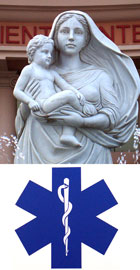
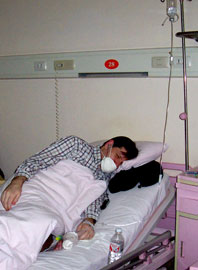 Well, our "life in
China" page has gotten too big to add more photos, so it must be time to
start a new page... Well, our "life in
China" page has gotten too big to add more photos, so it must be time to
start a new page...
(left) This is Michael in the hospital--a grim reminder
of how ill he was before receiving two weeks of treatment for pneumonia
in January 2005 (doctors said that Xi'an's pollution was the cause, and
advised us to move to a city with cleaner air).
We find it interesting that the hospital's main symbol
(right) looks a lot like the Madonna and Child. You can also learn the
origin of the "snake on a pole" symbol (on the hospital's ambulances) in
Numbers chapter 21, verses 4 to 9 (that's in the Bible). Jesus also
refers to this in the book of John, chapter 3, verses 14 to 18. |
|

Michael left the hospital on January 20, 2004, and flew (the same
day) to Qingdao in northeastern China, looking for a job in a
less-polluted environment. This windy port city was controlled
by Germany before the Japanese took it over in the 1930s. The Germans
built breweries here, and ever since then the city has been the home of
China's most famous beer (Tsingtao). (Michael wasn't happy with the job
prospects there; so we turned our attention to Kunming.)
Michael left Qingdao a week later, and was joined in Hong Kong by Vivian
and Andrew for an annual conference for Jian Hua Associates. After a week in Hong
Kong, we headed to Xiamen. |
|
There was something poetic about
this lonely lion, one of two beasts guarding a great field of rubble in
Kunming's expanding high tech zone. The old buildings that were torn down
were not very old, but apparently the space was needed for even grander
facilities. I guess the lions weren't moved because they are very heavy,
but to me they present a small portrait of China: ancient beauty and
culture in the midst of continual change. Just as the lion is "king of the
jungle," business is "king" in China. But like the immovable lions, the
forces of change must dance around China's core values and traditions. The
rubble is temporary, and the traditional lions will vigilantly watch over
the changes, ready to welcome whatever comes next. (Click
here for another note about construction sites.)
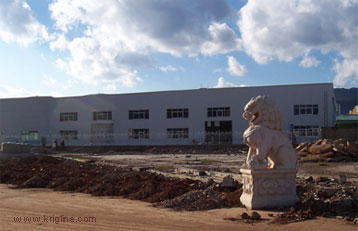
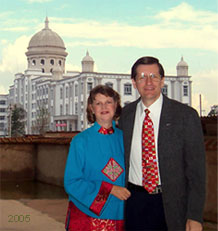
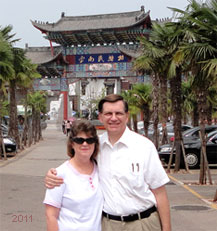
Vivian and I (shown in front of the main "Business
School" building in 2005, and then near the
Terra Cotta warriors in 2011) enjoy being here to help in whatever way we can, seeking to equip
tomorrow's leaders with the language tools they need for success in the
21st century. By creating a textbook, we feel
that we have made a lasting contribution to China's development, though
each life we touch is also part of our "lasting contribution." If we can help students and colleagues to embrace the
virtues and values that have served mankind well for millennia in the
process, then all the better. To paraphrase a great leader, what good is
it for a person or nation to gain material success at the expense of his
or her soul? That which can be seen is temporary, but that which is unseen
is eternal. |
|
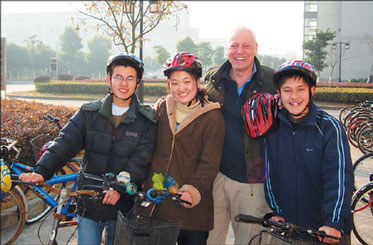
David Scott with
some students in Wuxi. For an interesting article about bike helmets in
China, visit:
http://www.chinadaily.com.cn/cndy/2009-01/05/content_7364828.htm On-line friends:
One joy of living in China is meeting other foreigners who
love the people of this country, and this website even allows me to meet
people "virtually." Such is the case with David Scott, a Canadian who
teaches in Wuxi. He stumbled onto my website while looking for teaching
materials, and via email we found that we have several things in common.
In January 2009, I found out that he has been promoting the use of bike
helmets in China, so I've posted a photo here (above) and a link to a China
Daily article about his new passion. You can also visit his website at
http://www.themaninchina.com/ |
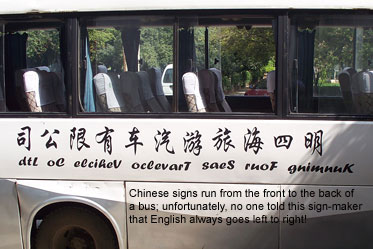
When I see a sign with substandard English, it just reminds
me of how important my job is! Most of the mistakes are small, but
sometimes they really get it wrong. Notice that the letters are not
backward; they just wrote them from right to left. My guess is that the
people in this sign company just don't use English much, and so they
mistakenly assumed that both languages can be written "front to back."
Oddly, when I show this picture to students, many don't know what is
wrong. I guess they can read the English just as well left-to-right or
right-to-left. But if you ask them to read something in ALL CAPS, that
gives them a lot of trouble.
Can Chinese
people buy homes? Well, not really. They buy homes on land that is
leased from the government. Click here for
more info (look for the word "purchased"). |
|
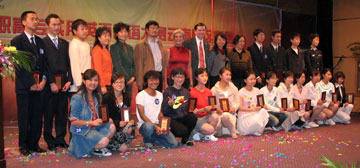
I don't try to
hide the fact that I don't like being a judge for English competitions
(mainly because I don't think it is fair to judge someone's language
ability from a short speech), but I must also admit that it is gratifying
to see the fruit of hard work obvious in these competitions. It is also
great to see how happy the winners are! |
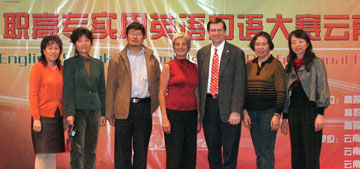
Another benefit
of judging is to meet other teachers, often from a variety of schools. In
my experience, most foreign teachers don't have much contact with our
Chinese colleagues because we (both foreign and Chinese) are all very busy
with our teaching duties. But I've enjoyed the occasional chances to work
together. |
|
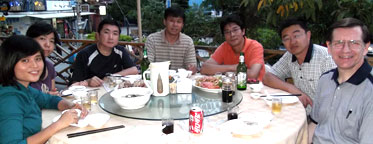
Officials from Yunnan Province
(one is a close friend) invited us to join them for some of Xiamen's
delicious seafood during a break at the 16th China International Fair for
Investment and Trade (第十六届中国国际投资贸易洽谈会, Sept 2012). They tried to persuade
us to return to Yunnan, and on Xiamen's hot summer days such an invitation
might be hard to resist! (Right) More special treats in the summer of
2012.
|
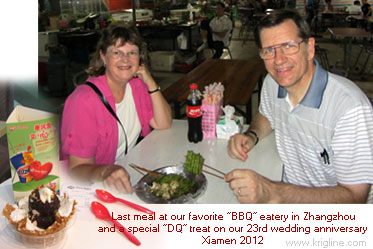
|

Click in the boxes below to go to some of our most popular pages. If
you get lost, just click "Home."
See our
Policy
regarding the use of materials available at Krigline.com or
Krigline.com.cn
|

 Well, our "life in
China" page has gotten too big to add more photos, so it must be time to
start a new page...
Well, our "life in
China" page has gotten too big to add more photos, so it must be time to
start a new page...









